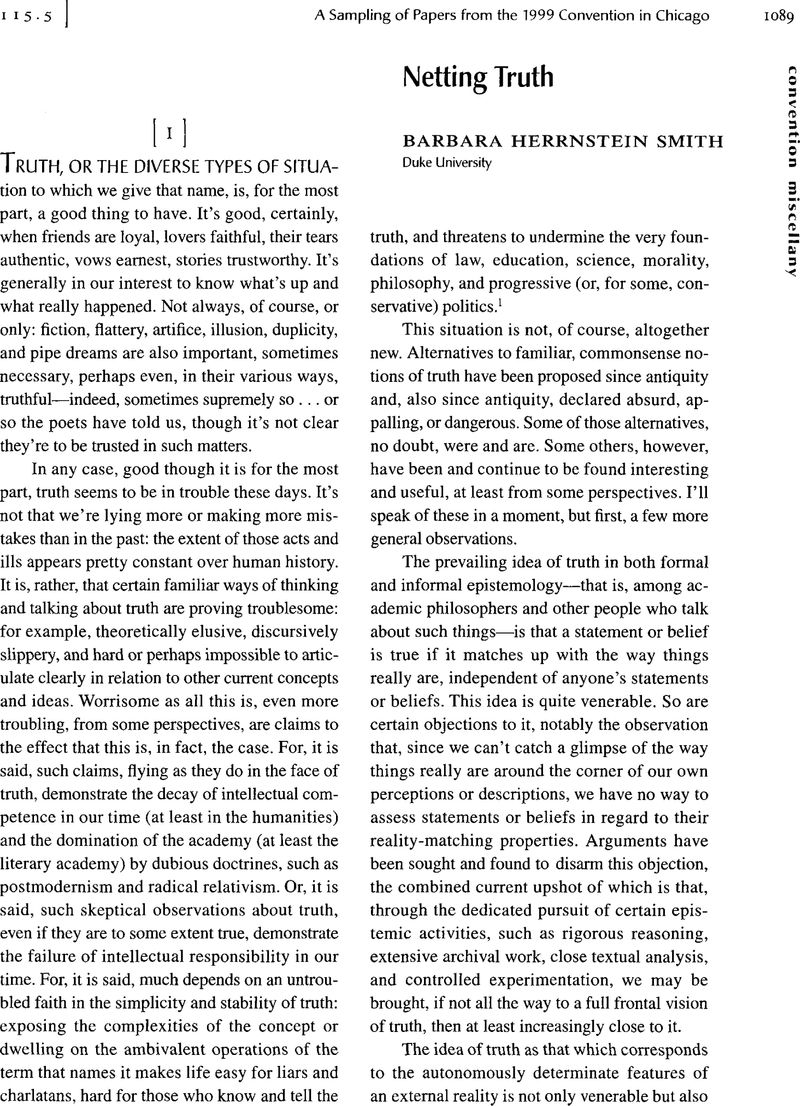Article contents
Netting Truth
Published online by Cambridge University Press: 23 October 2020
Abstract

- Type
- Other
- Information
- Copyright
- Copyright © Modern Language Association of America, 2000
References
1 Examples of such views are commonplace. For the charge of incompetence in the humanities, see, e.g., Paul R. Gross and Norman Levitt, Higher Superstition: The Academic Left and Its Quarrels with Science (Baltimore: Johns Hopkins UP, 1998) 71–106; Alan Sokal and Claude Bricmont, Fashionable Nonsense: Postmodern Intellectuals' Abuse of Science (New York: Picador, 1998); and Noretta Koertge, ed., A House Built on Sand: Exposing Postmodernist Myths about Science (New York: Oxford UP, 1998) 3–6, 9–31, 59–70, 272–85. For the charge of intellectual and moral irresponsibility, see, e.g., Gertrude Himmelfarb, On Looking into the Abyss: Untimely Thoughts on Culture and Society (New York: Knopf, 1994) xii. For the idea that post-Reformation, post-Enlightenment intellectual developments in the West make life easier for liars, see Philip Fernandez-Armesto, Truth: A History and a Guide for the Perplexed (London: Bantam, 1998) 194–95. For charges of political complicity, see Terry Eagleton, The Ideology of the Aesthetic (Oxford: Blackwell, 1990) 378–79, and Christopher Norris, Uncritical Theory: Postmodernism, Intellectuals, and the Gulf War (Amherst: U of Massachusetts P, 1992). For discussion of such responses to contemporary reconceptuali-zations of truth, see Barbara Herrnstein Smith, Belief and Resistance: Dynamics of Contemporary Intellectual Controversy (Cambridge: Harvard UP, 1998) 23–36.
2 Ludwik Fleck, Genesis and Development of a Scientific Fact, ed. Thaddeus J. Trenn and Robert K. Merton, trans. Fred Bradley and Trenn (Chicago: U of Chicago P, 1979).
3 Karl Popper, The Logic of Scientific Discovery, rev. ed. (1959; New York: Harper, 1965).
4 Fleck 100.
5 Fleck 101.
6 Fleck 79.
7 Compare with this the epigraph of Popper's book, a line from Novalis: “Theories are nets: only he who casts will catch” (11). For Popper, the net—an individually conceived conjecture—may catch truth; for Fleck, the net—a web of shifting, intersecting, interacting beliefs and practices—is truth.
8 Fleck 27,38.
9 Not every statement issued in the name of “constructivism” can be explicated along the lines indicated here, and many statements (on truth, as on other topics) issued in the name of “social constructionism” and “postmodernism” are no doubt problematic. This array of labels and positions neither explains nor justifies, however, the crude conflations and sensationalist characterizations of contemporary challenges to classic conceptualizations of truth that appear in works such as those cited above (see nl).
10 Thomas S. Kuhn, The Structure of Scientific Revolutions, 3rd ed. (1962; Chicago: U of Chicago P, 1996).
11 Kuhn evidently read Entstehung und Entwicklung in 1949 while a junior fellow at Harvard, and he cited it as formative in the original (1962) preface to The Structure of Scientific Revolutions (vii-xiv). In his foreword to the 1979 English translation of Fleck's book (Fleck vii-xii), he gives a more restrained account of the relation of his own thought to Fleck's.
12 Barry Barnes, T.S. Kuhn and Social Science (New York: Columbia UP, 1982); David Bloor, Wittgenstein: A Social Theory of Knowledge (New York: Columbia UP, 1983).
13 Bruno Latour, The Pasteurization of France, trans. Alan Sheridan and John Law (Cambridge: Harvard UP, 1988).
14 For relevant discussion of pragmatist conceptions of truth, see Barry Allen, Truth in Philosophy (Cambridge: Harvard UP, 1993) 56–72.
15 For inferences along such lines in regard to pragmatist-constructivist conceptions of truth, see the works by Fernandez-Armesto, Eagleton, and Norris cited above in nl.
16 Recent works in science studies that foreground the types of coordination described here include Wiebe Bijker and John Law, eds., Constructing Networks and Systems (Cambridge: MIT P, 1994); Charles Goodwin, “Seeing in Depth,” Social Studies of Science 25 (1995): 237–74; Andrew Pickering, The Mangle of Practice: Time, Agency, and Science (Chicago: U of Chicago P, 1995); and Bruno Latour, Pandora's Hope: Essays on the Reality of Science Studies (Cambridge: Harvard UP, 1999).
17 Susan Haack, “Concern for Truth: What It Means, Why It Matters,” The Flight from Science and Reason, ed. Paul R. Gross, Norman Levitt, and Martin W. Lewis (New York: New York Acad, of Sciences; Baltimore: Johns Hopkins UP, 1996)61.
18 Himmelfarb 151–53; Norris, What's Wrong with Postmodernism: Critical Theory and the Ends of Philosophy (Baltimore: Johns Hopkins UP, 1990) 77–133; Sokal and Bricmont 124–33. For discussion of the intellectual and institutional operation of such divergences, see Smith 125–52.
19 For artificial intelligence and cognitive science, see Tim van Gelder and Robert F. Port, eds., Mind as Motion: Explorations in the Dynamics of Cognition (Cambridge: MIT P, 1995); Edwin Hutchins, Cognition in the Wild (Cambridge: MIT P, 1996); and Horst Hendriks-Jansen, Catching Ourselves in the Act: Situated Activity, Interactive Emergence, Evolution, and Human Thought (Cambridge: MIT P, 1996). For theoretical biology, see Humberto Maturana and Francisco Varela, The Tree of Knowledge: The Biological Roots of Human Understanding (Boston: Shambala, 1988), and Robert N. Brandon, Concepts and Methods in Evolutionary Biology (Cambridge: Cambridge UP, 1996) 161–78. For the psychology of perception, see A. Blake and A. Yul-lie, eds., Active Vision (Cambridge: MIT P, 1992). For cultural anthropology, see K.R. Gibson and Tim Ingold, Tools, Language and Cognition in Human Evolution (Cambridge: Cambridge UP, 1993) 449–72.
20 For further details of Fleck's life and career, see T.J. Trenn and Robert Merton, “Biographical Sketch,” Fleck 149–53, and Thomas Schnelle, “Microbiology and Philosophy of Science, Lwów and the German Holocaust: Stations of a Life—Ludwik Fleck 1896–1961,” Cognition and Fact: Materials on Ludwik Fleck, ed. Robert S. Cohen and Thomas Schnelle (Dordrecht: Reidel, 1986). A selection of Fleck's translated papers also appears in the latter volume.
- 3
- Cited by


